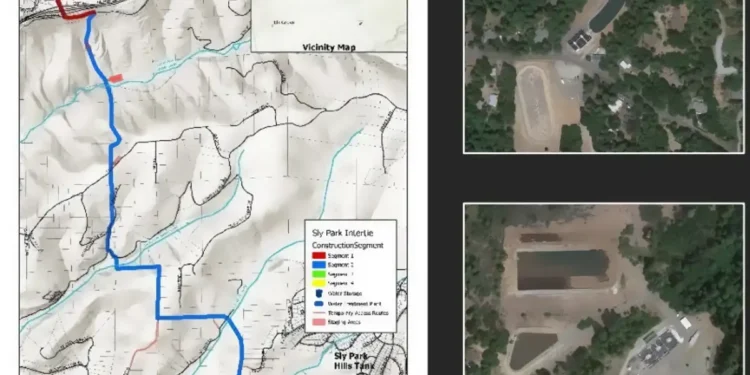El Dorado County (March 29, 2024) – In the heart of Pollock Pines, California, lies the Sly Park Intertie (SPI) pipeline, a lifeline for water supply transmission and reliability for the El Dorado Irrigation District (District). Originally laid down in 1978, this 3.5-mile conduit had faithfully served its purpose until 2013, when the creeping tendrils of corrosion and persistent leaks rendered it inoperative.
The SPI pipeline serves as a crucial link between the District’s two primary gravity-fed water sources: Reservoir 1 Water Treatment Plant (Res-1) and Reservoir A Water Treatment Plant (Res-A). Together, these sources represent a staggering two-thirds of the District’s water supply. Yet, the pipeline’s failure has underscored the vulnerability of this vital infrastructure, necessitating urgent action to bolster resilience and ensure uninterrupted water flow to the community.
Enter the Sly Park Intertie Improvements Project, a beacon of hope for water security in the region. This ambitious endeavor aims to breathe new life into the SPI pipeline, enabling the District to access and convey water supplies across its service areas with enhanced operational flexibility and an additional layer of reliability.
However, such undertakings do not come without scrutiny. In adherence to the California Environmental Quality Act (CEQA), the El Dorado Irrigation District has meticulously crafted a Final Environmental Impact Report (FEIR) to address potential environmental ramifications and stakeholder concerns.
The FEIR, a comprehensive document compiled in accordance with CEQA guidelines, encapsulates the essence of the project’s environmental assessment. It includes the Draft Environmental Impact Report (DEIR), comments and recommendations received on the DEIR, responses from the lead agency to significant environmental points raised during the consultation process, and other pertinent information crucial for decision-makers.
As the lead agency spearheading the Sly Park Intertie Improvements Project, the El Dorado Irrigation District has taken proactive measures to engage stakeholders, solicit feedback, and address environmental considerations. The FEIR serves as a cornerstone in the decision-making process, providing decision-makers with the necessary insights to evaluate the project’s feasibility and its potential impacts on the surrounding ecosystem.
With completion and certification of the FEIR underway, the District stands poised to chart a course towards a more resilient water infrastructure, safeguarding the future water needs of the community. As the wheels of progress turn, the Sly Park Intertie Improvements Project symbolizes a testament to proactive planning and unwavering commitment to water reliability in the face of evolving challenges.










